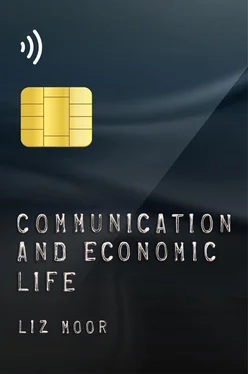Learning the language of finance may not be for everyone, but Lanchester nonetheless captured something important about the gap between the language of economics on the one hand, and the economic experiences of ordinary people on the other. This gap has been observed since at least Hayek’s time: he lamented the domination of economics by mathematics and statistics, and the tendency of economists to adopt a ‘scientistic’ tone that gave special significance to ‘numerical statements and quantitative measurements’ (1942: 275). For him, this took economists too far away from the attempt to understand the human and subjective groundings of economic action. In recent years, however, this criticism has taken on a new significance, as those with an undergraduate degree in economics, or related subjects such as accounting, have come to occupy a growing proportion of senior roles in the civil service (in contrast to the earlier dominance of classics and the humanities), as well as more broadly in government and public life (Davis 2017: 598–9). The consequence, some suggest, is a serious knowledge gap between those in power and those they represent, on questions that have a material effect on their lives.
Problems of comprehension are also blamed on ‘the media’, and particularly those media organizations with a public service remit. Criticism of their role in economic communication typically takes two forms. The first, which often comes from media and communication researchers, is that there is a bias or skew in the selection of viewpoints and speakers that feature in coverage of economic issues. In the UK, early studies of media coverage of the economy found a tendency to replicate dominant narratives and framings (Eldridge 1995), while more recent studies have found that many mainstream discussions of economic matters privilege voices from business over either academic economists or the representatives of workers and unions (e.g., Berry 2016a). A second criticism, arguably even more powerful, is that national media, including public service media, often fail to explain economic debates in ways that are accessible to a wide audience. This in turn reinforces, rather than reduces, the gap in understanding between the public and those in power (or those with a background in business and finance). Consider the findings of two surveys from 2015 and 2016: in one, 60 per cent of adults in the UK could not identify the correct definition of GDP from a multiple choice, and almost half could not identify the correct definition of the government budget deficit, yet only a tiny number described the subject as ‘unimportant’. In another, only 12 per cent of respondents agreed that ‘politicians and the media tend to talk about economics in an accessible way that makes it easy to understand’ (Inman 2015; YouGov 2016). Taken together, this lack of understanding of key concepts, and the widespread sense that neither governments nor media organizations are especially willing to explain them, means that only those with existing knowledge are able to take something useful – or even comprehensible – from economic news coverage. This has unfortunate implications for democratic participation, since it makes it much harder to evaluate politicians’ claims about the country’s economic situation, or their proposals for future action. And faced with large volumes of hard-to-parse information, it may be more tempting to rely on ‘gut instinct’ – something that can easily be manipulated by politicians (see, e.g., Andrejevic 2013; Davies 2018a).
Both criticisms have merit, and both turn on the claim that, one way or another, media are not just reporting on reality but shaping it – either through a heavy-handed or partial framing of issues, or by neglecting the educational or explanatory dimensions of their role. But I want to suggest a third way in which media shape reality, which is through their definition of ‘the economy’ itself. The claim of this book is that there is in fact a lot more to economic life and economic communication than the contents of the business, financial and economics sections of newspapers or television news, and that while the language of economics and the media reporting of economic issues are vitally important areas of research and study, they should not be seen as coextensive with the economic lives of most people. Many people find it hard to see their own lives reflected in either the official language of economics or the way economic matters are reported on television, but this is partly because the definitions of ‘the economy’ in these places are so limited. What is more, these limitations are often replicated in academic studies of economic communication. When this happens, social science disciplines make it harder rather than easier for people to understand the connections between ‘the patterns of their own lives and the course of world history’ (Mills 1959: 4).
In what follows, I attempt to challenge these narrow definitions of the economic, and expand our horizon away from news and current affairs. Instead, I propose a framework for thinking about economic communication that foregrounds the broader category of communicative practices rather than ‘media’, and that understands economic life not only in terms of the macro economy and GDP, but more sociologically as a set of processes of providing for material wants and needs, which may be subjectively meaningful for those engaged in them (Weber 1978). To do this, I first highlight how economic action itself is communicative, and then explore how our economic lives are constructed communicatively in a variety of modes that move through, but also exceed, mass media. The modalities that I focus on in Part IIof the book – promotion, information, narrative and discussion – remind us not only that ‘the economy’ looks different in different communicative practices, but also that the values governing economic life are not so uniform as they sometimes seem. A communicative practice like ‘informing’, discussed in chapter 4, may have two quite different sets of meanings: one that is relatively open, and has to do with disseminating facts and ideas; another that is more secretive and involves passing information to those in power. Discussions online often challenge the accounts of economic life offered by banks or even schools, and the economic narratives found in films and novels, discussed in chapter 5, often reflect quite different value systems from those found in television news or newspapers’ financial pages. This plurality of values matters, because it is part of what makes economic change thinkable.
In the remainder of this introduction I outline the frameworks and theoretical ideas that underpin the chapters that follow, and the account of communication and economic life that the book offers: first, I explore the idea that ‘the economy’ is a historical construction, rather than natural category, and the consequences of this for social science researchers; next, I outline the rationale for starting from a conception of ‘communication’ or ‘communicative practices’ rather than ‘media’; finally, I explain why it is appropriate to assume value plurality in economic life.
The economy and ‘economic life’
In arguing that media researchers would benefit from a new way of thinking about communication and economic life, I am suggesting, first of all, that they need a way of framing ‘the economy’ that does not depend solely on the definitions used by governments, or the range of topics designated as ‘economic’ by television news. The first step, therefore, is to recognize all the ways in which the economy, as an object of study, is already constructed, even before its appearance in media. Michael Emmison (1983) has shown that modern uses of the term ‘economy’ did not appear until the 1930s, alongside Keynes’s conception of the macro economy and his proposal of a wider role for government in managing it. More recently, Timothy Mitchell has shown that the modern Western concept of ‘the economy’ – in the sense of ‘the structure or totality of relations of production, distribution and consumption of goods and services within a given country or region’ (1998: 84) – emerged with the shift from colonial government to a post-colonial world order, and partly as an outgrowth of the experience of colonial rule (Mitchell 2002: 83–4). Here, ‘the economy’ appears at the intersection of various new forms of discourse, techniques of measurement and forms of classification, including maps that link territories to ownership, and statistics that capture information about populations and their assets.
Читать дальше











![John Bruce - The Lettsomian Lectures on Diseases and Disorders of the Heart and Arteries in Middle and Advanced Life [1900-1901]](/books/749387/john-bruce-the-lettsomian-lectures-on-diseases-and-disorders-of-the-heart-and-arteries-in-middle-and-advanced-life-1900-1901-thumb.webp)